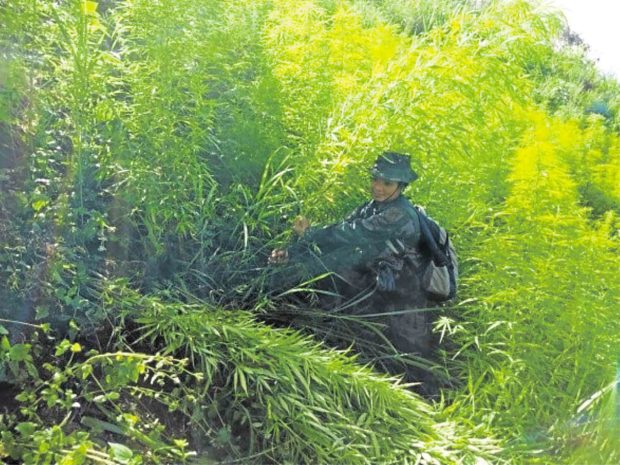Marijuana burning triggers fire in Kalinga tree farm

BAD WEED The fight against illegal drugs brings policemen to remote plantations in the Cordillera mountains to destroy marijuana plants. —PHOTO COURTESY OF PNP CORDILLERA
BAGUIO CITY, Benguet, Philippines — Residents of Tinglayan town in Kalinga province have sought help from the police on how best to restore their pine tree plantations, which were razed by a fire triggered by law enforcers carrying out marijuana eradication in March.
An official of the Department of Environment and Natural Resources (DENR) on Monday said the fire razed pine trees planted in 22.5 hectares.
Marijuana plants uprooted were automatically destroyed by burning but the operations might have triggered brush fires that spread to a 50-ha tree farm overseen by three peoples’ organizations in Tinglayan town, according to Ralph Pablo, DENR Cordillera director.
The fire happened on March 27 in Barangay Loccong in Tinglayan.
2-day blaze
Article continues after this advertisement“Residents fought to suppress the fire. It took them two days to beat the blaze, which spread due to the steep terrain and high winds,” said lawyer Severino Dalutag, Tabuk City community environment and natural resources officer.
Article continues after this advertisementThe tree farm was about 100 meters from the marijuana plantation.
The Cordillera police and the Philippine Drug Enforcement Agency earlier said marijuana plants worth P70.5 million were uprooted and burned in the three-day operation in Loccong.
On June 14, residents met police officials to discuss new protocols regarding future eradication drives, Dalutag said.
Like ordinary grass
He said the police volunteered to help replant 30,000 seedlings between July and October, the monsoon months. “We are trying to raise the seedlings. Loccong residents want to build a pine forest to match the natural pine growth in neighboring Balbalan town,” Dalutag said.
Loccong continues to be the subject of antidrug operations because marijuana “grows naturally in the area like ordinary grass,” he said.
Kalinga and Mountain Province are transshipment points for marijuana, police said, adding that they were considering putting up a police outpost at the provinces’ borders. —Reports from Vincent Cabreza and Valerie Damian